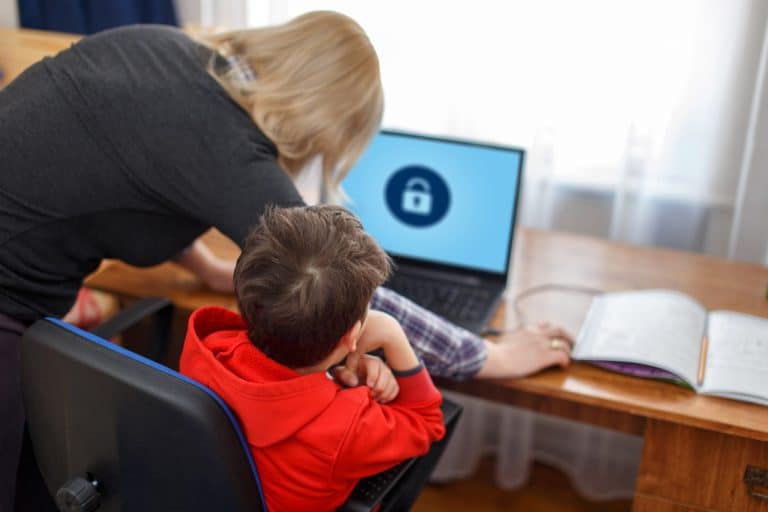Have you ever asked yourself, how do I reduce my screen time for kids? After all, too much screen time can have adverse effects on children’s health and wellbeing. Whether it is long term effects, like lack of sleep, or short term ones, like losing focus and getting sick. Screen time addiction in kids is hard to overcome but here are some easy ways to reduce screen time for kids.
Reducing screen time for kids does not have to be a chore. For starters, we need to look at the why and how question. Why do our kids need less screen time? How can we cut down on their screen time? When parents want to reduce their kid’s screen time, many times it is because they are concerned with the health impact of too much time spent in front of electronic devices.
Before setting time limits on children for devices, it is necessary to allocate the time for ourselves. Parents are unable to dedicate the required amount of time to their children nor listen to them. We demand screens so much that we sometimes forget about the demand of our kids.

Overuse of screens is why parents and caregivers should set limits to how much time their children spend before the screen. Kids spend maximum time on the internet, watching TV, and playing video games.
The online movies and games get kids addicted to the screen. Platforms like Netflix, Amazon Prime require parental control such that kids stay away from unwanted content online and safely use the internet. Here is a complete guide on how to set parental control on Netflix. The depreciation of screen time is possible only by spending less time in front of the computer and more time being physically involved.
Physical presence and interaction are safer options as kids are not bored and are not tempted to be in front of the screen repeatedly. Spending time with family or friends outdoors is possible when all are eager to limit their respective screen times.
In This Article
How Parent’s Screen Time Influences Kids?
When we use screen time in excess, it can lead to various problems like mental problems and obesity. Kids make use of screen time, especially when they see their parents do so. To avoid the negative consequences, we must first try to figure out what motivates children to spend so much time in front of a computer.
Children learn and improve their behavior by observing others, especially their parents, or surrounding people around them, including what they gather from screen time. In reality, the types of devices parents use, and their duration are the most reliable predictors of their children’s computer use and screen time.
In addition, parents have power over the availability of displays and technology when kids demand the latest cell phone or video games. It is upon parents to look after the kid’s screen time and put forward laws to govern their use.
Why Should Parents Limit Their Screen Time?
Parents should limit their screen time. This idea of limiting screen time puts a lot of pressure on parents. You have to look after kids on the one hand and the other hand, let go of your screen time.

The excess use of screens can lead to distracted parenting in which you forget responsibilities by engaging most of your time on screen. While parents are responsible for limiting their children’s screen time, the pressures of today’s world – as well as work and home responsibilities – can make it difficult for parents to turn off and restrict their own screen time.
Mobile phones allow for continuous communication, making it more challenging to handle and lead to distracted parenting. Although parents are believed to spend more time with their children than in the past, the nature of such experiences is thought to have declined.
According to a study conducted in the United States, parents of children aged 5 to 18 spend marginally less quality time with their children than they do on their phones.
Digital technology, according to sociologists, media theorists, and technology experts, is distracting us, resulting in adverse social and emotional effects. Although we are aware that parents’ screen time affects their children’s screen time, we are less aware of the effects of distracted parenting due to screen time.
Children always say, “Just a minute,” and many parents confess to spending too much time on their phones while with their children. Because of the impact of such terms, social scientists coined the term “technoference” to explain how technology affects social relationships, including the most significant of all: the relationship between parents and their children.
Effects On Kids Due To Overuse Of Screen By Parents
Parents’ technophobia may negatively affect babies and young children, including decreased emotional well-being, missed attention bids, less positive experiences, inappropriate child behavior, slower language growth, and a rise in child injuries.
More than one-third of children aged eight to thirteen felt unimportant when their parents used a phone during meals, talks, or other family time, according to a survey of more than 6000 children aged eight to thirteen. Children who don’t have their parents’ attention diverted by their phones at family gatherings feel they need more attention and seek more care.
When children feel protected and receive affection from their parents, they flourish. For happy parenting, happy children, healthy relationships, and deep bonds, turning off and placing screens away during family time and time with children on their own is critical.
Evidence shows that parents who are present (not distracted) reap the benefits of their immediate social environment. The same evidence indicates that the technology that is supposed to bind us might, ironically, sever our ties with the people who matter most to us.
8 Tips To Limit Screen Time By Parents
Screen time is so freely available today that many parents wonder how to limit the amount of time your children are spending on electronic devices. With study after study linking technology use to a variety of behavioral issues, it is only natural that parents would be concerned about screen time.

1. Talk to the family:
When kids and parents communicate, their focus lies on the one present in front of them. Talking reduces the time for both parents and kids spent on screen. You must explain to children that staying healthy requires them to sit less and walk more.
The stress on the eyes due to over-screen time can lead to various eye problems like eye-straining, headache, and even cybersickness. Unless it’s for work or homework, health experts recommend no more than two hours of computer or television time a day.
It is to remember that children under the age of two need to stay away from television altogether. TVs should not be used as a way for reward or even punishment as in the end spending more time in front of the screen is not good. Kids will find TV much more valuable when it’s used as entertainment or punishment.
2. Set Screen Time Limit
You can strictly limit your screen time by setting rules. Setting rules with reminders to not access screens for a more extended period is a good idea. Make a daily limit of one to two hours of screen time a house rule.
You should set an example by limiting your own screen time through the rules set. Kids will observe it and obey the same rule. It may be challenging to start with the rule, but it is beneficial in the long run.
3. Screen Time vs. Active Time
Keep track of how much time one family member spends in front of the screen. Do that for all family members. With this, you can figure out what improvements to make. Check how much time you spend with your family and your family spends with mobiles or television or computer.
The screen time may be for your office work or your kid’s homework. Also, include video games and your favorite show. After that, calculate how much time you spend in physical activities. Physical activities include active chores, exercises, sports.
Sit together with your family and discuss the time spent for both. Try to increase your active time more than screen time. At Least bring a balance between the two for better living. Make schedules and routines such that you and your family have more active time.
4. Activities During Screen Time
When you are busy with screen time, you can set extra time for exercises or just walking. You may visit your kid’s room during breaks and know what they are up to. A run on the treadmill will refresh you.
Raising weights or doing some yoga poses stretches your body and refills it with energy. You can ask your kid to join you, and they will learn the same habit of giving themselves a break during the screen time.
During commercial breaks, you can try some games or push-up challenges with the jumping jack. This distraction will change your kid’s focus from screen to other activities, and eyes don’t stress out. Push-ups and other forms of exercise keep everyone healthy.
5. Get To Know TV Ads
When you are watching tv or screening through social media, there are a lot of advertisements. These advertisements include junk food, including candies, soda that is not so healthy for kids. Kids learn and demand such food.
When you avoid opening television or other screens with marketing content of the latest food supported by some celebrity, kids may stay away from demanding it. The health of you and your kid should remain unaffected by the influence of tv advertisements.
Explain to your kid that just because his or her favorite celebrity is on the ad does not ensure that the product is the best. As a parent, you should try to stay away from the influence of television advertisements and shows.
6. Make Bedroom Screen Free
Sleep is essential for all of us. Mostly we have a television in our bedrooms, and we fall asleep to the music of our favorite show. If not, kids end their day by setting up an alarm for the next day.
Our day begins with the screen and ends with the screen. It is good not to set up television or computers in the kids or our room. Children who have televisions in their rooms watch 1.5 hours more a day than those who do not.
Kids remain inside their room, not wanting to miss their favorite show and video gaming is just another reason for them to skip having meals together with family. Furthermore, screens provide a good option for kids to escape daily family meetups. If you do not engage in too much screen time and set up dining rules, kids spend less time with screens.
7. Other Options To Screen
Screens lure your kids, and somehow they stay inside the house stuck in front of the monitor, hypnotized by the devices. When you start getting addicted to screens, you may forget about other things. You may even have family time in front of the tv with half focus on tv and half on other family members.
It is best to develop ideas during a family time like outdoor games, new sporty hobbies, or trips. It’s high time that you crop the screen and mingle it with your day-to-day life. A brisk walk can also help you and your kid have a fantastic time.
When parents themselves cannot move, then kids learn the same. So you can take the initiative and make your kids play outdoor games, maybe teach them yoga or play basketball every evening, escaping monotonous screen time.
8. Focus On Family While Eating
After a tiring day at work, having a meal together with your family is the best thing to do. You can adjust this time for breakfast, but morning time is full of rush, and you may not find enough time to interact.
While driving, make sure you have enough time to communicate rather than kids enjoying the tv or other devices in vehicles. Travel time is an excellent time to ask your kids about their daily life while you focus on driving.
Remember to switch off cell phones or tv during meals. If you do not switch off mobile, then while one family member keeps speaking on the phone, others have to listen to it anyway. Set a rule to keep distractions away while eating. If you have a tv in your dining room, then the best solution is to switch it off.
According to studies, families that eat meals together eat more healthy meals. You can prioritize having meals together with family members above other things. Aim for having food at least two to three times a week if you have a busy schedule.











